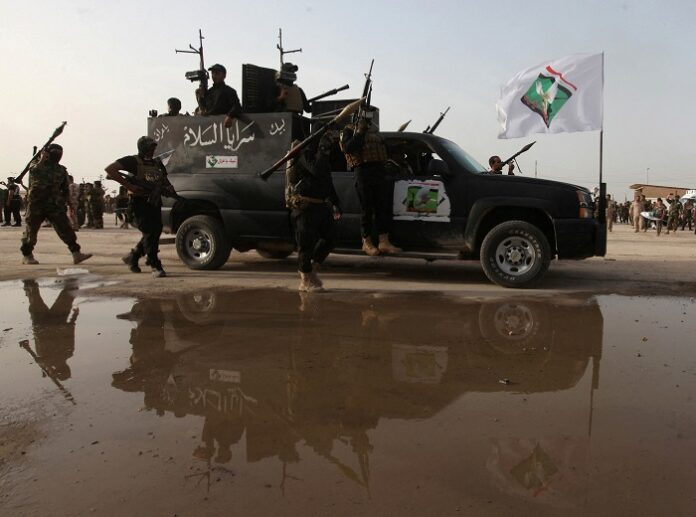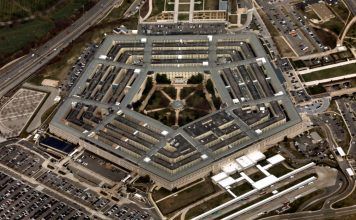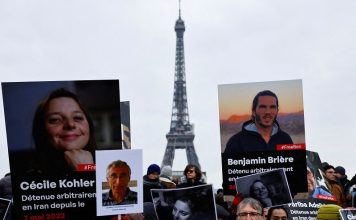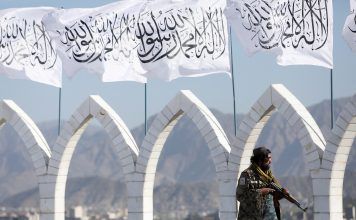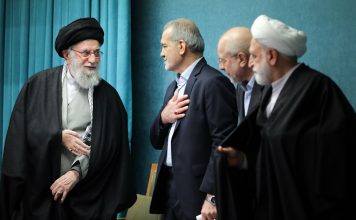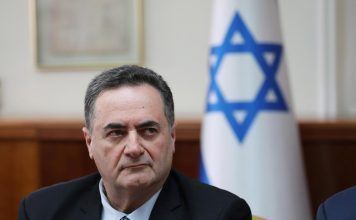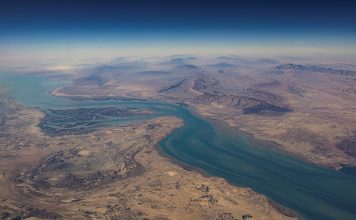[aesop_image img=”https://kayhanlife.com/wp-content/uploads/2022/08/2022-08-09T054906Z_79915238_RC2QSV904WS3_RTRMADP_3_IRAQ-RELIGION-ASHURA.jpg” panorama=”off” credit=”SENSITIVE MATERIAL. THIS IMAGE MAY OFFEND OR DISTURB. ” align=”center” lightbox=”off” captionsrc=”custom” caption=”Supporters of Iraqi populist leader Moqtada al-Sadr gash their heads with blades during a ceremony marking Ashura, the holiest day on the Shi’ite Muslim calendar, at Tahrir Square in Baghdad, Iraq August 9, 2022. REUTERS/Thaier Al-Sudani” captionposition=”left” revealfx=”off” overlay_revealfx=”off”]
By John Davison and Ahmed Rasheed
BAGHDAD, Aug 23 (Reuters) – On Feb 8, two powerful men – one a cleric, one a soldier, both fellow Shi’ite Muslims – met to discuss the future of Iraqi politics and the dominant role here of neighbor Iran.
It didn’t go well.
Iranian Brigadier General Esmail Ghaani visited the home of Muqtada al-Sadr, the prominent Iraqi cleric and former battlefield foe of American troops during the U.S. occupation here. Sadr has millions of faithful supporters across Iraq, some comprising an armed militia. He is a leading powerbroker in this majority-Shi’ite country.
Ghaani leads the Quds Force, the foreign military and intelligence branch of Iran‘s Revolutionary Guards, used by Tehran’s Shi’ite theocracy to project power abroad. He is charged by Tehran with keeping its influence in Iraq intact.
[aesop_image img=”https://kayhanlife.com/wp-content/uploads/2021/12/2021-12-22T111454Z_1504951163_RC2NJR9XXQKH_RTRMADP_3_IRAQ-IRAN-MILITIAS-scaled.jpg” panorama=”off” credit=”REUTERS./” align=”center” lightbox=”off” captionsrc=”custom” caption=”FILE PHOTO: Esmail Ghaani Head of Iran’s elite Quds force, gives a speech during a ceremony to mark the one year anniversary of the killing of senior Iranian military commander General Qassem Soleimani in a U.S. attack, in Tehran, Iran January 1, 2021. ” captionposition=”left” revealfx=”off” overlay_revealfx=”off”]
According to four Iraqi and Iranian officials briefed on the half-hour encounter in the holy city of Najaf, Sadr received the general with trademark brusqueness. He wore a black-and-white Arab headdress and brown robe – a deliberately local look and a contrast to the all-black vestments and Shi’ite clerical turban he generally wears in public.
[aesop_image img=”https://kayhanlife.com/wp-content/uploads/2022/08/2022-08-23T123620Z_1288907702_RC2B2W915QHO_RTRMADP_3_IRAQ-IRAN-SHIITES.jpg” panorama=”off” align=”center” lightbox=”on” captionsrc=”custom” caption=”Iraqi populist leader Moqtada al-Sadr looks on, on the day of his meeting with Iranian general Esmail Ghaani, wearing traditional Arab clothing, a contrast to the Shi’ite clerical vestments he normally wears in public, in Najaf, Iraq, February 8, 2022 in this handout picture. REUTERS./” captionposition=”left” revealfx=”off” overlay_revealfx=”off”]
Sadr’s fashion statement, the officials said, echoed his nationalist political message: Iraq, as a sovereign Arab state, would forge its own path, free of meddling by its Persian neighbor, despite sectarian ties between the Shi’ite-dominated countries.
“What does Iraqi politics have to do with you?” Sadr challenged Ghaani, according to one of the officials. “We don’t want you interfering.”
Iran‘s government didn’t respond to requests sent to its Foreign Ministry and its United Nations delegation seeking comment. Sadr’s office didn’t respond to questions from Reuters, either.
Sadr was feeling buoyant, the officials said, energized by a series of political wins for his nascent pan-Iraqi alliance against Iran and its Iraqi supporters – fellow Shi’ites who see Tehran as their best ally to maintain power and check undue influence from the West or Sunni Arab states.
Although Sadr seeks to stay above the fray of retail politics, declining to seek office himself, he has been a crucial force in Iraq for much of the two decades since the U.S. invaded and overthrew Saddam Hussein.
In addition to power at the ballot box through legion Sadrist voters, he has maneuvered aides into top ministries and other senior government jobs, ensuring a grip on much of the Iraqi state.
In 2019, his supporters joined anti-corruption protests that toppled a government led by pro-Iranian parties. Last October, Sadr supporters outperformed those parties in parliamentary elections, opening the door for the formation of a government that could pull Iraq entirely out of Iran‘s orbit.
Hence Ghaani’s visit.
The general, those familiar with the visit said, was solicitous.
He had sought the meeting for months, visiting Iraq regularly and once publicly praying at the grave of Sadr’s father. If Sadr included Tehran’s allies in any coalition, the Iranian officials say Ghaani told him, Iran would recognize Sadr as Iraq’s main Shi’ite political figure, no small gesture among the religious community’s fractious leadership.
Sadr was unswayed. In a tweet after the meeting, he stressed his commitment to a government free of foreign interference. “Neither Eastern nor Western,” he said, in the handwritten message scanned into Twitter. “A nationalist majority government.”
The rebuff amounted to far more than just a failed meeting.
In the months since, neither Sadr and his allies nor the pro-Iranian parties have forged a coalition to succeed the caretaker administration of Prime Minister Mustafa al-Kadhimi, a compromise candidate who runs the government until parliament votes upon a new administration to replace him.
Tensions between pro-Iran and Sadrist militias led to targeted killings of at least five people between those camps over two weeks in February. And Sadr’s efforts to outmaneuver Tehran led Iran and its proxies to counterattack politically and militarily, including rocket strikes against would-be allies Sadr had been courting – Kurds in northern Iraq and officials in the United Arab Emirates.
Iran’s Revolutionary Guards Attack Bases in Iraq’s Erbil, Iranian TV Says
So frustrated was Sadr by the impasse and the Iranian pressure that in June he ordered his 73 lawmakers, nearly a quarter of the parliament, to resign. In July and August, he led thousands of his supporters to stage a long sit-in at the chamber.
“Punish the corrupt immediately,” Sadr said in a public statement. “Especially Shi’ites.”
Sadr’s vehemence alarms many who fear today’s tensions could fuel further instability and, ultimately, more violence within Iraq and across the Middle East.
“If we want stability in the Middle East, it can’t work when there’s lots of public unrest and competition over power in Iraq, which then becomes an arena where regional competitions play out,” Jeanine Hennis-Plasschaert, the United Nations’ special representative to Iraq, told Reuters.
Within Iraq, the possibility of renewed bloodshed frightens many. The U.S. invasion this century and a long war with Iran in the last still haunt the populace. “Sadr could lead us into a Shi’ite on Shi’ite war,” said one pro-Iran militia commander in southern Iraq, where the fighting among factions grew deadly around the time of the February meeting.
To better understand the instability gripping Iraq, Reuters spoke with over 40 Iraqi and Iranian officials, politicians, foreign diplomats, and locals. Some of the officials, including those who described the Sadr-Ghaani meeting, spoke on condition of anonymity.
The news agency also reviewed dozens of government documents detailing judicial decisions, government spending, and corruption probes, and traveled across the country’s impoverished south, home to most of its Shi’ite population and a region where residents say the deadlock is worsening historic problems with graft and institutional neglect.
“There’s a political battle in Baghdad, and we’re stuck in the middle,” said Walid Dahamat, a teacher in the poor southern town of Amarah and the brother of a local activist who was murdered by unidentified gunmen in 2019.
The infighting among Shi’ites, and tension over what role Iran should play in the country of 40 million people, has led to Iraq’s longest run without a stable government since Saddam’s ouster. It is also paralyzing state institutions and rekindling disputes over oil, responsible for more than 40% of the country’s economy and 85% of the government budget.
Squabbling over the country’s oil wealth, locals and foreign observers say, often takes precedence over actual governance. “Leaders are focusing on control over resources, power and vested interests instead of the needs of Iraqi people,” Hennis-Plasschaert said.
Iran has much at stake, relying on Iraq as a buffer and commercial gateway to the Arab world. Tehran is beset by international sanctions, pressure to revive a nuclear agreement with the United States, and a realignment of Middle Eastern alliances.
Without Iraq in its sphere of influence, Tehran could lose yet more power in a region where some of its Islamic neighbors, including the UAE, in recent years have established closer ties with the United States and Israel, its traditional foes.
For the West, Sadr may be the best hope of wresting Iraq from Iran‘s dominance.
“The interests of the U.S. and of Sadr’s coalition have intersected,” said Andrew Peek, a former Iraq specialist at the U.S. State Department and now a fellow at the Atlantic Council, a Washington-based think tank. Sadr’s split with Tehran is “the biggest threat to Iran‘s influence in Iraq, the moment where there might be an actual challenge to it.”
“THE KING OF IRAQ”
Sadr, now 48 years old, first rose to prominence as the son of Mohammed Sadiq al-Sadr, a historic figure in Iraq who helped lead Shi’ite resistance to Saddam. The senior cleric, and two of his other sons, died from gunshots in a 1999 ambush widely believed to have been orchestrated by Saddam’s government.
A prominent young cleric himself at the time, Sadr inherited the allegiance of many of his father’s followers.
After the 2003 U.S. invasion, Iraq’s Shi’ites worked to emerge from the Sunni dominance of Saddam’s dictatorship. Sadr grew cozy with Iran.
With aid from Tehran, according to former advisors and diplomats, he successfully positioned himself as a populist fighting to expel Western aggressors. Thousands of insurgents, many of whom still make up the Sadrist militia known as the Peace Brigades, saw him as their leader.
Shi’ites took power in Baghdad starting in 2005, winning a majority in the first parliamentary elections of the U.S. occupation. As Shi’ite parties consolidated their hold in subsequent elections, however, many Iraqis increasingly perceived their administrations as corrupt, focused only on controlling oil wealth and the patronage it enables.
“This political system has failed,” said Mohammed Yasser, a longtime Shi’ite activist in southern Iraq. “They have provided nothing.”
Because most of those governments were allied with Iran, Sadr gradually distanced himself from Tehran.
Eager to cast his movement as incorruptible, he encouraged supporters to stage mass demonstrations, preluding those that toppled the last Shi’ite coalition in 2019. He also began currying favor with Middle Eastern governments traditionally at odds with Iran, even Sunni-led powers.
In 2017, Sadr surprised many in the region by meeting with senior officials in the UAE and Saudi Arabia, Persian Gulf neighbors led by Sunni dynasties and allied with the United States. To overcome the historical rift between Sunni and Shi’ite regimes, Sadr played to ethnic ties instead.
“We are also Arabs,” he told them, according to one senior Sadrist familiar with the visits.
Sadr made his first public critique of Iran that year, accusing Tehran in a statement of fueling sectarian conflict in Syria, Iraq and across the region. He also stepped up criticism of domestic rivals for Shi’ite influence, including former Prime Minister Nouri al-Maliki, a staunch Iran ally.
“Muqtada wants to be Shi’ite leader number one,” one former adviser told Reuters, “the king of Iraq.”
In 2020, two events tilted the landscape upon which Sadr would operate.
First, the United States in a drone strike killed Qassem Soleimani, Ghaani’s predecessor as the head of Iran‘s Quds Force and a major player in Iraq. Soleimani had a strong relationship with Sadr, despite the cleric’s critiques of Tehran. Then, the UAE established diplomatic relations with Israel, solidifying a shift in some Arab states toward the West.
Those developments played into Sadr’s hands.
His outreach to Persian Gulf neighbors, for instance, immediately led to help after the election with the task of courting Iraqi Sunnis. Iraqi officials familiar with the process told Reuters that Emirati envoys prodded Sunni parties to work toward an agreement with Sadrists.
“For the Persian Gulf countries, Sadr was the best chance to challenge Iranian power,” said Yazan Jabouri, an influential Sunni leader who attended meetings with the Emiratis.
The UAE’s Foreign Ministry didn’t respond to Reuters’ requests for comment.
Sadr had also courted the Kurds, a minority ethnic group with its own regional government in Iraq’s north. Shortly after the election, Sadrists and the Kurdistan Democratic Party, the ruling group in the region, told local media they would team up in a new government. For Iran, the alliance was a double setback, particularly because the ruling Kurd party, too, has friendly relations with Israel.
By January of this year, Sadr’s alliance appeared solidified – Sunnis, Kurds and Sadrists united in a coalition they dubbed “Save the Homeland.” They elected Mohammed Halbousi, a Sunni and ally of Gulf states, as speaker of the parliament, overriding opposition from pro-Iran parties and taking the first step toward the formation of a new administration.
Soon, it seemed, they would have enough votes to form a government.
Tehran at first struggled to respond, especially without Soleimani, the Iranian general killed by the U.S. His influence in Iraq dated back to the earliest days of the resistance to American occupation. Two Iranian officials familiar with discussions early this year told Reuters that Tehran asked Ghaani, Soleimani’s successor, to keep pro-Iran militias united and to seek the crucial sitdown with Sadr.
Iraq’s Sadr Tells Judiciary to Dissolve Parliament in a Week Amid Tussle With Iran-Backed Coalition
“THINGS WERE ABOUT TO GET REALLY TOUGH”
Before Sadr and Ghaani could meet, some of Iran‘s allies decided to make clear their displeasure with any move away from Tehran.
On February 2, a little-known Shi’ite militia based in southern Iraq launched drone strikes on Abu Dhabi, the Emirati capital. The militia, known as the “True Promise Brigades,” said the strikes were in response to the UAE’s meddling in Iraq and Yemen, where a festering civil war has pitted regional proxies, led by Saudi Arabia and Iran, against one another.
The UAE said at the time that it intercepted the strikes.
But the attack spooked the Emiratis, according to an Iraqi government official, a Western diplomat and two Iraqi Sunni leaders who had worked with the UAE’s envoys in the coalition talks. The UAE sent officials to Tehran and Baghdad to quell tensions.
“Their commitment to Sadr wavered,” Jabouri, the Sunni leader who participated in the efforts to form a government, said of the Emiratis.
Sadr and Ghaani met the following week.
Three days after their strained encounter, Sadr summoned aides to his home, several of his advisors told Reuters. He was visibly frustrated by the mounting tension, they said, and had even resumed smoking, an old habit he had quit and never done in public.
“He told us we weren’t just in confrontation with Iraqi rivals, but with the Islamic Republic,” said one advisor, whose account of the meeting was corroborated by two other senior Sadrists with knowledge of the meeting. “That things were about to get really tough.”
Iran got an assist from Iraq’s judiciary, controlled in large part by judges appointed by pro-Tehran parties.
Days before parliament was to vote on a new president, Iraq’s Supreme Court decreed that a two-thirds majority was needed for the chamber even to meet. The ruling ruined the planned vote by “Save the Homeland,” whose simple majority was no longer enough to convene the assembly.
A flurry of other rulings by the court followed.
One barred Hoshyar Zebari, the coalition’s preferred candidate for the presidency, because of old corruption allegations. Zebari, a Kurdish politician and former finance and foreign minister, has denied any wrongdoing and hasn’t been convicted of any crime.
Another ruling slowed graft investigations that Sadrists were conducting against pro-Iran officials. A third banned the regional government in Kurdistan from dealing directly with foreign oil companies, targeting a crucial source of revenue for the important coalition partner.
Iraqi law experts and political insiders said the rulings, while legally sound, were strategically timed.
“It was no coincidence,” said Sajad Jiyad, the Baghdad-based director of the Shia Politics Working Group at The Century Foundation, a U.S. think tank. “At the same time that there’s a government formation deadlock and Sadr has the upper hand, four to six rulings come out.”
Iraq’s Supreme Judicial Council, which oversees the country’s courts, in a statement to Reuters said the rulings weren’t political. Other Supreme Court rulings, including its ratifications of the parliamentary election results and the speaker voted upon by the coalition in January, benefited the Sadrists, it noted.
Iran‘s ire then grew explicit.
On March 13, the Revolutionary Guards fired 12 missiles at the Kurdish regional capital of Erbil. Kurdish officials reported limited damage to a neighborhood outside the city center and no injuries.
In a statement, the Revolutionary Guards said they launched the missiles because Israeli military operations were being conducted from Kurdistan. Tehran didn’t elaborate or provide any proof of Israeli operations.
Israel’s Foreign Ministry and Defense Ministry didn’t respond to requests from Reuters for comment.
The Kurdish government denied the accusation and saw the strikes as yet more retaliation for choosing sides among Shi’ites. “They wanted us to ally ourselves with the whole Shi’ite community, not one part against another,” said a senior Kurdish official, who was involved in talks with Iranian envoys around the time of the strikes.
Iran and its allies began pressuring Sadr’s Sunni partners, too.
In April, Maliki, the former prime minister and one of Sadr’s foremost Shi’ite rivals, helped repatriate and absolve two influential Sunnis who had fled Iraq because of terrorism charges, according to five lawyers and three government officials familiar with the effort. They told Reuters that Maliki himself helped convince a Baghdad court to drop those charges.
As soon as the two Sunnis were cleared, they began denouncing the leadership of Halbousi, the Sunni parliament speaker elected by Sadrists and their allies, saying other Sunni leaders were better options.
In a television appearance, Maliki denied he had assisted the two men, but said he had asked the court about their charges and helped one of them get from the airport to an audience with the judge. Critics found his comments contradictory. Maliki’s office didn’t respond to requests from Reuters for comment about any role he played in the return of the two Sunnis.
Halbousi was rattled, according to an official close to the speaker.
Amid growing criticism about his leadership from other Sunnis, he flew to Tehran, where he sought to ensure he could still have a working relationship with Iran even if the coalition that elected him failed to form a government. “Halbousi wanted assurances that if Sadr failed, he would have support from Iran,” the official said.
A spokesperson for Halbousi said the speaker had traveled to Iran on official business at the request of the Iranian parliament. She declined to discuss the visit further.
By May, Sadr’s push to form a government stalled. No other coalition emerged to form its own government.
In June, Sadr ordered the Sadrist lawmakers to resign, ceding further control of the chamber to rivals. Sadr’s office released a statement citing the impasse, the Supreme Court rulings, and disagreements with “some countries,” without elaborating, as reasons for the withdrawal.
Days later, in a video online, Sadr addressed his former legislators and urged them to reject any alliance “unless God provides an opening and the corrupt are swept aside.”
Sadrists increasingly express exasperation about their inability to form a government. Some call for renewed unrest. “This time the methods of reform will be different,” Abu Mustafa al-Hamidawi, the head of Sadr’s militia, recently told an Iraqi news site. Reuters was unable to reach al-Hamidawi for further comment.
Sadr now calls for new elections, which some believe will only delay a reckoning with political rivals.
Recently, Sadrists marched toward parliament to join colleagues there occupying the chamber to protest the impasse with other parties. Sadr’s old rival Maliki patrolled with bodyguards outside his home, brandishing an assault rifle. Pro-Iran groups staged their own demonstrations, stoking fears of armed clashes.
In southern Iraq, where tensions are most acute, locals are fed up by what they see as continued corruption and an infrastructure collapse. Despite a record income of $60 billion in oil revenues for Iraq’s government in the first half of 2022, residents often go without water or electricity.
Dahamat, the teacher in Amarah, was already frustrated by what he described as government inaction after the murder of his brother. The activist was killed after he spoke out against graft and the unmet needs of the poor south. His killers haven’t been apprehended.
Now, Dahamat said, authorities don’t perform basic maintenance at his primary school. He and colleagues, he told Reuters, recently paid for a pump and a sink to make a bathroom usable. The local school administration didn’t respond to a Reuters request for comment.
“No one in power has ever done anything for us,” Dahamat said.
(Additional reporting by Parisa Hafezi in Dubai. Editing by Paulo Prada.)

